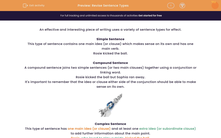An effective and interesting piece of writing uses a variety of sentence types for effect.
Simple Sentence
This type of sentence contains one main idea (or clause) which makes sense on its own and has one main verb.
Rosie kicked the ball.
Compound Sentence
A compound sentence joins two simple sentences (or two main clauses) together using a conjunction or linking word.
Rosie kicked the ball but Sophia ran away.
It's important to remember that the idea or clause either side of the conjunction should be able to make sense on its own.
The conjunctions that join two simple sentences together are called coordinating conjunctions and are easy to remember because their initials spell the word FANBOYS.
These are: For, And, Nor, But, Or, Yet and So.

Complex Sentence
This type of sentence has one main idea (or clause) and at least one extra idea (or subordinate clause) to add further information about the main point.
Rosie, who loved to play outside, kicked the ball.
While the sun shone, Rosie kicked the ball.

In this case, the subordinate clause has to rely on the main clause for the sentence to make sense. It cannot exist on its own.
Subordinate clauses are joined to a main clause using a subordinating conjunction.
Let's have a go at some questions now.








